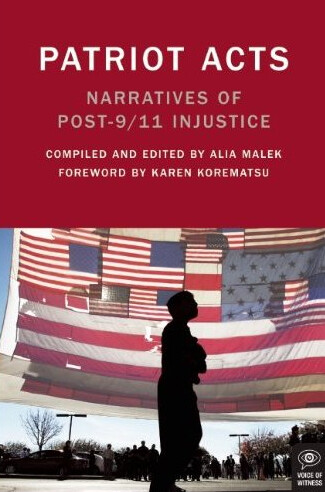The Electronic Intifada 22 March 2012

Patriot Acts: Narratives of Post-9/11 Injustice tells the stories of individuals in the United States whose rights have been abused as a result of the racist, Islamophobic backlash and the so-called War on Terror that followed the attacks of 11 September 2001.
Patriot Acts is part of the non-profit Voice of Witness publishing project, which aims to “illuminate human rights through oral history,” and has published books on the aftermath of hurricane Katrina in New Orleans, wrongful incarceration and undocumented immigrants. Compiled and edited by Alia Malek, a civil rights lawyer turned journalist, Patriot Acts features testimony from 18 individuals who lost family to racist vigilantes, were swept up in immigration raids under the guise of national security, fired from a job, or subjected to extraordinary rendition.
Highly readable and intensely engaging, Patriot Acts includes an introduction by Karen Korematsu, whose second-generation Japanese American father, Fred T. Korematsu, “defied US military orders to be incarcerated along with 120,000 people of Japanese ancestry living on the west coast” (9), at great expense to his freedom.
The mass internment of Japanese Americans after the bombing of Pearl Harbor during the Second World War offers a warning for contemporary times. The civil liberties and human rights of countless people living in the US have been sacrificed in the name of national security, recalling one of the most shameful periods in US history.
The stories told in Patriot Acts are quite shocking. Sixteen-year-old Adama Bah, the daughter of immigrants who fled Guinea, was awoken by armed FBI agents who arrested her and her father. Bah was put in a juvenile detention center and subjected to humiliating treatment based on unfounded suspicions that she was shortlisted to be a suicide bomber; her father was eventually deported to Guinea.
Though now free, Bah states, “I still live in constant fear of federal agents taking me or any of my family members. They did when I was innocent, and they could do it again” (47).
Persecution
The persecution of Muslim Americans in the US court system is shown through the experience of Palestinian American Ghassan Elashi, who cofounded what was formerly the largest Islamic charity in the US, the Holy Land Foundation. He is now serving a 65-year sentence in a Communications Management Unit — special detention centers for terror convicts (this was the subject of Malek’s investigative feature”Gitmo in the Heartland” published by The Nation last year).
Elashi and four of his colleagues — dubbed the Holy Land Five — were subjected to two extraordinary trials that, amongst other court precedents, relied on testimony from an anonymous Israeli intelligence agent. The men were accused of providing material support to Hamas, a Palestinian political party declared a terrorist organization by the US State Department, by funding Islamic charitable committees in Palestine through the Holy Land Foundation.
Though the five were not accused of any violent acts, “prosecutors focused on the killing of Israeli soldiers and civilians by Palestinian elements, and specifically Hamas, as opposed to the actions of the HLF [Holy Land Foundation] or the defendants themselves” (199).
Aside from arbitrary detention and unjust convictions, Patriot Acts includes testimony from parents who fought against anti-Arab racism and Islamophobia in their children’s schools, and undocumented immigrants who were subjected to deportation proceedings as part of the national security crackdown.
Hate crimes
But scariest of all is perhaps the story of Rana Sodhi, a small business owner in Phoenix whose family had left India because of religious persecution, only to face worse treatment in the US. Sodhi’s brother Balbir was gunned down in front of his gas station on 15 September 2001, targeted because he wears a turban as part of his Sikh faith. A second brother, Sukhpal, was shot and killed in his taxi in San Francisco; police said it was gang-related violence, but Sodhi insists that this too was a hate crime.
Patriot Acts is eye-opening even for the reader who is familiar with the racist, bigoted backlash and deterioration of civil liberties after 11 September 2001. Its readability makes it a highly-recommended title for a high school or university class reading list.
The book is also a useful resource for researchers thanks to its appendices. A timeline traces the development of counter-terrorism legislation and its political context, and a thought-provoking analysis is presented in the essay “US Counterterrorism after 9/11.”
Though it could have benefitted from more careful copy-editing, Patriot Acts deserves a space on the shelf of every public and school library in the US. The stories told in Patriot Acts must be heard widely and serve as warning that the US is hurtling down a most dangerous path.
Maureen Clare Murphy is managing editor of The Electronic Intifada.


